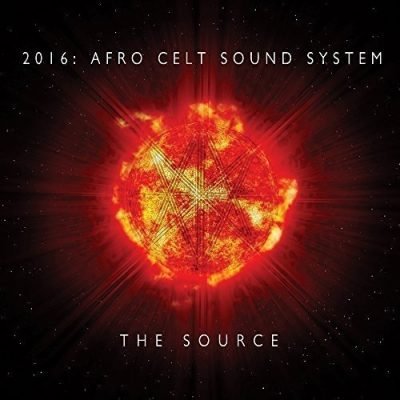Videos
Story
World music fusion takes fluid forms in the 21st century, from live collaborations and pop hits to club anthems. European and African based, globally-connected collective Afro Celt Sound System have been instrumental in fuelling that far-reaching approach; over 20 years, they’ve found kindred spirits across international talent, and forged a reputation for exhilarating shows and an accomplished catalogue of albums, dating back to their 1996 debut, Volume 1: Sound Magic. Now ACSS continue their adventures on ECC Records, with their first studio recording for a decade: The Source.
As its title suggests, The Source summons the original Afro Celt energy and legacy, while simultaneously yielding fresh inspirations. “There was so much scepticism when we started out,” admits Grammy-nominated multi-instrumental founder and producer Simon Emmerson. “We’ve gone from what was a fairly eccentric concept 20 years ago, to something that everyone understands; I think that’s testimony to how resilient the music is. What we’ve also got in the UK is an incredibly creative collaborative environment – and now the soil that we’re farming is much more fertile.”
Emmerson recalls a creative force that sparked from his early-’90s work with celebrated singer and guitarist Baaba Maal in Senegal, and a meeting of minds with Dublin-born musician Davy Spillane. It led to a jam session of African and Irish musicians laced with electronic beats at Real World’s studios in Wiltshire (with the surreal backdrop of the likes of Johnny Depp, Kate Moss and Iggy Pop milling around), from which Afro Celt Sound System’s debut album took flight.
“Back then, Davy told me: ‘This is your destiny; you’ve discovered something deep here’,” says Emmerson, happily. “For this album, I wanted to return to that moment, when we had no idea what to expect.”
The Source is arguably the most expansive and exuberant Afro Celt Sound System work to date. Its track-listing brings together core members including Guinean vocalist, kora and balafon virtuoso N’Faly Kouyate and charismatic dhol master Johnny Kalsi, along with long-standing collaborators such as Davy Spillane and Emer Maycock on uillean pipes and whistles, Moussa Sissoko on djembe and talking drum, and members of Scottish folk fusion Shooglenifty (who contributed to the very first Afro Celt album).
There are also welcome newcomers to the family, including the gritty, witty rhymes of Gaelic rapper, musician and language activist Griogair (an exponent of “ghetto-croft”, with a nod to his off-grid base in the Scottish Highlands), and the hauntingly soulful delivery of Armagh-born vocalist and flautist Riognach Connolly, who leads Beware Soul Brother, inspired by a homage to legendary Nigerian poet Chinua Achebe. “The song is all about what happens when something you love is stolen,” explains Emmerson. “It’s a very powerful lyric.”
The classic Afro Celt ethos prevails here – this collective has never regarded identity as something that should create boundaries, and they combine a genuine respect for international styles with finely-tuned musicianship and fearless collaboration. And so The Source embraces devotional harmonies (notably the exquisite sound of Guinean female quintet Les Griotes, who contribute to songs including opener Calling In The Horses), protest songs, rockabilly guitars (Desert Billy) and powerful electronic rhythm,s. Club culture also remains a key element of Afro Celt Sound System; it’s part of Emmerson’s own background, from discovering a passion for ska and Blue Beat at his South London comprehensive school, to his youthful move to Camden’s squat scene.
“The Source is a genuinely collaborative effort,” adds Emmerson. “I was determined that there would be complete equality of input and writing on this album. There’s less people shouting at each other, and more people listening; it’s more intuitive. For instance, the track Cascade starts with Emer’s whistle then Irish uillean pipes … N’Faly adds a kalabash groove, and Robbie Harris plays percussion over the top. You can only do that when you open up the playing field. We’re all talking the same language now, and it is an open conversation.”
The Source was recorded at various locations across Europe, including Spillane’s own studio by the Cliffs of Moher, an experience which Emmerson jokingly likens to a Game Of Thrones quest (“Go and seek out the wise man on the remote cliffs”). He credits the adept mixing skills of David Bottrill and Mass for their “alchemical art” in bringing the album’s varied elements and spontaneous twists together.
One of the most celebratory numbers is The Magnificent Seven, a stirring reunion with the mighty Dhol Foundation, with the vital percussion spurred along by a vocal chant which translates as “courage” in Kouyate’s native tongue of Mandinka. The Source also rounds things off in spirit-soaring style, with Kalsi Breakbeat. “That was done with a huge amount of fun,” says Emmerson. “We wanted to write a track that would smash it at festivals.”
The new album’s characteristic energy should certainly translate to Afro Celt Sound System’s latest live sets, kicking off 2016 at Glasgow’s Celtic Connections festival. This collective has come a long way, and they’re still taking us to new places. As Emmerson points out: “Multi-culturalism isn’t our agenda; it’s our life.”
©Arwa Haider 2016
The Source
Comme suggéré par le titre, The Source revient à l’énergie des débuts et aux éléments qui ont fait le succès d’Afro Celt Sound System tout en y apportant des inspirations nouvelles. Cet album est indéniablement le plus expansif et le plus exubérant de la formation à ce jour. Les morceaux rassemblent les musiciens clés d’Afro Celt Sound System comme N’Faly Koutaye, Johnny Kalsi, Davy Spillane ou encore Emer Maycock mais aussi des nouveaux venus comme le rappeur gaélique Griogair, le leader de Beware Soul Brother Riognach Connolly. L’énergie injectée dans The Source devrait sans aucun doute se retrouver dans les lives du groupe. Ce collectif a déjà parcouru un long chemin mais continue de nous transporter dans des lieux inconnus. Comme Emerson le souligne, « le multi-culturalisme n’est pas quelque chose que nous programmons; il fait partie de nos vies. »


